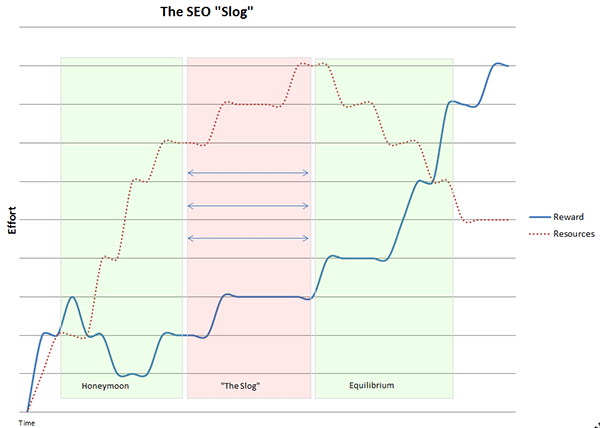A large building is being constructed nearby my office downtown. A construction fence is erected beneath a sign featuring a rendering of the gleaming skyscraper to come. But to the lay observer, there’s little visible evidence of progress, just noise, traffic diversions and dust. Before long, letters to the editor will show up in the paper. Politicians will field questions. “Why’s it taking so long?” But the informed among us realize the construction crews were doing required infrastructure work to support the gleaming tower. Soon, foundations in place, the tower will reach for the sky. But for now, they are in The Slog of the project.
In the SEO/SEM industry, we have our own “Slog.” SEO initiatives require un-sexy infrastructure work on undeveloped properties without moving the corporate KPI needle much at all for a while. And like the skyscraper, tension can rise as this drags on.
The fact is, the Slog is getting longer and deeper, and we need to come up with ways to survive it as consultants and agencies.
– Scott Clark

“The SEO Slog”
If you’re hired to “do SEO” as an agency or consultant, and you’ve been honest in setting expectations, then at least one other person at the company understands your plan – if you’re screening clients, you’ve probably also received some form of promise not to ignore your advice and to help obtain needed resources and cooperation from leadership.. So, with this assurance, contracts are signed. Full-in, as the project progresses you may move beyond your advocates’ influence and best intentions. This is the beginning the real test of the client’s ability to move through the slog, and for you to have the finesse needed to navigate obstacles.
So while we’ve always had to remain in a client’s good graces, being paid for work long enough to see measurable results, that duration was shorter in the past. Back then, SEOs could move the needle with quick “hero fixes” that could buy time for content and link building work and resources to win long term success.
The Mid-Slog Ambush
Post Panda, Penguin and Hummingbird, the Slog has expanded in the form of a tension force between resources and requirements and client patience for KPI evidence. And we also have the “Content Shock” phenomenon where we’re competing for the limited audience attention and time. This tension often gets the attention of less informed outsiders, sometimes those who are signing your checks. This can result in ambush meetings with an uninformed, yet influential managers or executives. Sometimes these meetings can go like this:
- Exec (looking at the status report you frantically prepared after being ambushed)

“I’ve stepped in and will be your contact from today forward. I’ve read your report. I don’t know a lot about domain equity, link profiles and crawly errors, but I see that you’ve all been at it a couple of months. How many leads did that bring us?” - SEO: (wondering where they hid your contact’s body)
“Ok, well, we’ve been repairing critical problems with your website. We’re now past that repair work and working on off-page SEO – building links and growing your social reputation..” - Exec:
“We spent a fortune on that website, and I thought it looked just fine, what kind of repairs?” - SEO: (having just spotted a printout of a Quick-e-rating LLC unsolicited SEO proposal on his desk, which probably lead to this ambush)
“The repairs were under the hood to allow Google and Bing to fully index your site. The site was developed without modern SEO considerations. Now that they are fixed, we need to ramp up the content to earn interest needed to rank.” - Exec: (while looking at Blackberry again)
“Well, my team are all busy on projects, so you need to work on other SEO things for now.” - SEO:
“There are no other “SEO Things” these days. To rank, you must deserve it, and currently, in the search engines’ eyes, you don’t. Your competition is moving forward, and the search engines are not easy to fool. We need to build interest in your site by appealing to people using compelling content, links and social media. Their actions, their links, their social media endorsements, are what will drive us forward. That’s why I’m asking for resources.” - Exec: (Looks at watch)..
”I have a 2 o’clock. How much are you charging us for this again?”

The Mid-Slog, Warm & Fuzzy Unsolicited SEO Proposal
We cannot ignore the impact that unsolicited (and often near-fraudulently erroneous) SEO proposals have on the less informed executives. These proposals can introduce doubt, distract attention and undermine training. They can make warm, fuzzy promises about shortcuts to rank and revenue while minimizing reference to the hard work required. I only try to let clients know that unsolicited proposals generally don’t come from reputable firms, but still find myself being asked to look at them as they come in.
[SEO Customers] believe that if you wish hard enough for a pony on Christmas, one will eventually find its way under the tree.
– Andrew Edwards article “Are We Coming to The End of SEO” on Mashable
The Simple Days Are Over
So as different departments, including executives, long for the simplicity of keyword lists and SERP screen shots, we must now bore them with KPIs like engagement, backlink diversity, re-query phenomena and personalized results considerations. For many who don’t know much about SEO, this does not feel like success, and if you’re not careful, you can start to feel like a failure as well, leading to a negative feedback loop that can poison engagements.
The Slog exists partially due to an ongoing shift from SEO initiatives executed by the SEO’s company towards SEO initiatives that require significant client effort as well. Simply put, the client must take a leap of faith that their increasing efforts (in content development, blogging, social sharing, etc.) based on your recommendations, will pay off.
– Scott Clark
So how are some of the top SEO/Digital Agencies Handling This?
I felt it a good idea to call upon old friends to give a perspective from several different types of agencies, consultants and marketers. The Slog surely looks differently to each of us, and we’ve all developed tactics for managing it. The responses proved me right – and the information is rich indeed:

Brian Carter
First I asked Brian Carter of The Carter Group, and learned that he uses audits as a tool to communicate process, set expectations and and guide execution.
“The Carter Group is a boutique full service digital agency, so we do more than SEO, but I think the issues you’re talking come up with all other digital marketing services like Facebook or AdWords advertising.
It’s about sales and account management. We have productized and separated our services, for one thing, so that an audit is sometimes separate from execution. If it looks like an audit is required before we’ll know what to implement, we recommend that first. We communicate what our processes will be and the timelines they can expect. That requires documentation- and we’ve built some of that into our service descriptions.
Setting expectations is the key- and continuing to manage them. There still can be big delays in getting access to various accounts and getting tracking in place before real implementation can start. When I first talk to a prospective client, sometimes I might sound pessimistic, because I’m trying to tease out their goals and let tell what obstacles might come up. But this also establishes expertise and makes it even more clear that they need us to guide them through it….
Big problems can arise when you end up working with someone other than who you sold-in to, because they may not have the same expectations. They were out of the loop. Clarity in the contract (and proposal if there is one) is critical, and needs to be reiterated in the first few weeks. What are the goals? What are the deliverables? What is the timeline? And what are our key metrics for measuring achievements? If you don’t find out at the beginning what will satisfy the client and get them to agree to that, you may have trouble with client satisfaction.
If you don’t find out at the beginning what will satisfy the client and get them to agree to that, you may have trouble with client satisfaction.
– Brian Carter
Sometimes you get scope creep, or strategy creep, where the client wants to add things in and doesn’t realize the impact that will have on implementation and results. Every time I see something like that, I point it out and talk about what it means, what the consequences might be, and reiterate why we had the original strategy.”

Ian Lurie
Ian Lurie CEO of Portent, Inc. nurtures relationships and trust above all to bridge the gap.
“The slog happens on every campaign.
The question is, do you have the personal trust of the client, so that they’ll let you get through it? If you don’t, then nothing – no amount of reasoned argument, no pile of evidence, no parade of other experts who agree with you – will help you through it. Whether the slog is really a slog depends on personal relationships, not intellectual or technical prowess.
Whether the slog is really a slog depends on personal relationships, not intellectual or technical prowess.
-Ian Lurie
So my advice: Don’t just focus on getting the work done. Become your client’s adviser and marketing confidant. Which is really what we should be doing, anyway.”

Scott Hendison
Scott Hendison of Search Commander remembers the early days of search when we could buy time with a few big hits, but now feels it important to downplaying the ranking element in favor of other KPIs:
“I wish I could say that we DO avoid getting bogged down in the slow slog of SEO change, but that’s not always the case. In the old days, we could almost always move the needle pretty quickly by finding some high traffic phrases for which the client ranked on page 2 and 3, and bumping them to page one with a few strategic links of shall we say “questionable quality”. Obviously, that’s no longer the case, and it’s gotten a lot harder to demonstrate value.
Now we try to manage expectations up front, we downplay the importance of “rankings” a lot, and instead focus on showing clients increased traffic and conversions, not only from Google and the search engines, but from referral sources too. I’ve found that a good metric for showing value is often the “search impressions” in Webmaster Tools, or the “number of phrases you rank for” in SEMrush”

Adam Audette
Adam Audette works with Rimm-Kaufman Group, which focuses on client-specific processes and clear communications about the grind of SEO. A bonus for RKG is their scope of engagements allow diverse deliverables blended with SEO, which helps give the time they need to manage the Slog.
“This is a really important topic.
My experience is primarily on the agency side, but I also have an in-house perspective from my time running SEO for Zappos. This is a crux issue for agencies. I have some broadly stroked advice and insight into how we run SEO relationships at RKG. First the advice:
1. Educate: it’s critically important that executives understand what’s really required for their SEO program to excel. They need resources, because they need to execute. Lack of implementation is the number one cause of SEO performance falling short (penalties and the like notwithstanding).
2. Expectations: both sides need to understand timing and expectations. What are you going to deliver, and when? What kinds of resources are needed on the client side, and when?
3. Resources: Companies that aren’t willing to budget resources for SEO work cannot expect anything to come of their program. There are no silver bullets in SEO, and nothing “to do” besides partner with the company solving technical issues, creating engaging content experiences, and promoting via social and other channels. We don’t have a secret “SEO dial” that we can turn to 11.
Companies that aren’t willing to budget resources for SEO work cannot expect anything to come of their program.
– Adam Audette
Since our agency offers a suite of services in digital marketing, we have more flexibility than smaller shops or consultants that only offer SEO. If resources are tight on the development side, we work with the client to allocate budget towards paid search or content. That helps, but we also have to adapt a process internally that suits the businesses we work with.
We do this by staggering our deliverables and working over a longer duration than typical. Instead of kicking off and then going dark for 30 days to complete an audit, we collaborate with the client on where the priorities and business goals exist, where the primary SEO issues are (ranked by high, medium and low order of priority), and then we dive into each one deeply and completely. This has the effect of distributing the SEO workload over a longer period of time, allowing more focus and resources to be spent on the right things that will actually help the company (and that they can execute on), and shows progress and builds trust quickly.”

Dustin Woodard
Dustin Woodard of SEO Naturale has adopted a referral only policy for new SEO clients, mitigating the risk of getting stuck in the Slog:
“My first line of defense is a harsh client filter. You’ll notice it first thing on my homepage; you can’t work with me unless you meet one of two conditions: we either know each other, or someone I trust refers you to me. Using your building analogy, whenever I work with a new client, I thoroughly survey the premises, paying close attention for that one golden nugget—that tweak that I can make early on that pays for my services many times over.
With trust & happiness fully established, I don’t face much resistance on taking the right path to SEO success. I also recommend hosting a fun, yet informative SEO 101 session for the marketing, dev, and executive teams. When they learn how complex, powerful and fascinating organic search is the slog doesn’t seem so… sloggy.”

Rhea Drysdale
Rhea Drysdale heads up a team of skilled SEO consultants at the boutique SEO agency, Outspoken Media. Rhea always has great operational insights, and this is no different:
“Slog. That’s a great word.
Why do our clients typically hire us? They don’t have the resources, knowledge, or interest in managing and performing The Slog themselves. Link building is a service offering, because it’s laborious. SEO audits are requested, because they’re technical and tedious. Content optimization… man, I remember having to write and optimize 400+ page titles for government facilities. Holy crap that was boring. The vast majority of SEO is slog.
But, we love SEO strategy, right? It’s creative and fun! We get to discover new industries and opportunities, but no one gets to the top of the SERPs by coming up with a brilliant strategy without execution. To achieve great results, you have to combine a winning strategy with the discipline of execution.
The other talented SEOs mentioned offer great tactics to minimize or cope with slog, specifically as it relates to client management. I’d like to take a different approach. Slog isn’t about the client, it’s about you, the consultant/agency.
Let’s talk honestly–not every client project goes well. Wha?! Yes. That’s the reality, as you already demonstrated, and the breakdown typically doesn’t happen over something technical or algorithmic, it happens with people. We failed to set an expectation. We didn’t have full client disclosure or discovery. Politics. (Insert a dozen completely legitimate reasons for a client/agency breakdown.) How do we avoid these hurdles?
I’ll highlight three areas we’ve focused on:
The Sales Process: Trust is earned and it starts early. How did a lead find you? What was their impression when they got to you? Did you follow-up quickly and really listen to them? Did you qualify the lead? Do you know that your team can have success with the account? Did you find opportunities that will drive immediate value? Do you know who the stakeholders are and their expectations? If you don’t have the right answers to these questions, but you sign the client anyways, you will encounter problems down the road. Trust me. Simply bringing on accounts to hit a revenue quota is as costly in the long run as a bad hire.
Team Training: Client management lives and dies with your team. Take the time to train them on project management and client communication or hire experienced team members. I’m guilty of throwing folks in the deep end before I taught them how to swim.
It’s vital that you have an experienced team who can instill confidence in your clients, demonstrate value, communicate expectations/needs, and change their tone to accommodate different stakeholders.
– Rhea Drysdale
Client On-Boarding: I love the SEO slog graph. It mimics Tuckman’s stages of group development–forming, storming, norming, and performing. Most groups get stuck in storming or norming. We have to understand that every team will have friction. It’s the nature of group development and when you hire an SEO agency/consultant, you are bringing two groups together that have to establish a relationship, set expectations, perform, and adjust strategy according to results. You have to remain level-headed and drama-free. You set the tone for your work. Take the time to invest in client on boarding, so that this new team (you and the client) are setup for success. Streamline it of course, but I’m talking about the difference a few calls (in-person is even better) can make to ensure everyone is on the same page. “
The New Normal Is Messy Indeed.
Rhea’s insights tie together some of the ideas shared by everyone.
While the reasons for the slog may rest squarely on client relationship issues, “Slog Management” is our problem.
It’s our job, it’s our responsibility, and it differentiates us from amateurs. It’s up to us to articulate this phenomenon in advance to clients like never before. It is there, it is real, and there are no shortcuts around it.
The ideas shared herein offer some excellent concrete ideas.. how to thrive when things are tough – to be Slogmasters when necessary, get up, brush off the muck and delight our clients on the other side.
I look forward to your comments and ideas as well. Thanks to everyone who took part.
Update: Check this response to the article here from James Luckhurst.
Update: Another excellent follow up is here, focused on managing expectations.
Update: Check out the MOZ Whiteboard Friday based on this article
Boots photo by Anna Tesar/ Flickr used under (cc) Creative Commons License









This article is probably the best I’ve read in awhile. Thanks so much for sharing.
I don’t understand why most seos don’t quit to do something else.
Anything else.
As someone who is a DIYer and wears an SEO hat occasionally, it is even hard for ME to not get stuck in the slog. Just when I think I am making headway, only to see an algo change. Blah.
While all of the experts above provide great insight, my favourite bit is Ian Lurie’s about becoming a trusted adviser and confidant.
If people in all industries actually cared about the impact they are having on other people’s lives and businesses, and realized every interaction or offer of service is an opportunity to positively effect things, we’d be in much better place.
Our industry is mixed with heavy doses of the people happy to cash monthly pay cheques, and other people who are content to sit back after many moons of effort, and take pleasure in knowing that a) they’ve executed (shout out to Rhea!), and b) they are helping someone else achieve goals set out for their businesses.
It’s the consistent little wins that put notches in a belt. We can’t all be Google’s or Facebook’s..
Great read indeed. Nice to know we are not alone.
Good night.
At first I thought slog stands for “SEO blog” :-) but so true, a savvy SEO consultant needs to plan and strategize for the expanding slog, especially in establishing the agreed goal together with the client.
“I wonder that an SEO expert doesn’t laugh whenever he sees another SEO expert”
Marcus Tullius Cicero
I found myself nodding my head in agreement almost the entire article. A lot of points hit close to home and it’s great to see some of the strategies used (as well as the advanced preparation) and compare them. Thanks for a great post!
Great article. It’s interesting to see how other agencies react to the “SEO slog” and i agree that an important part of it all is educating the client and managing expectations.
Damn this is one fine article. Plenty of “Aha” moments for sure and “of course, now why didn’t I think of that” moments for me. But I have to admit- I really like how the audit process should be used to communicate the SEO process, manage expectations and to guide execution- with a capital “M” for managing expectations. (unless you don’t mind your clients asking for a refund that is…)- thanks again for the cool article, I’ll be back for sure.
Well said, Jeff. There are plenty of us who look beyond the pounds and dollars and try hard to bring value beyond our costs to clients every day. Happily, the quick-dollar group of SEOs are shrinking. I’ve even offered free SEO proposal reviews for businesses in my area to attempt to flush out the snake oil.
take care
Glad you enjoyed it… I also had these a-ha moments talking with my friends who contributed. It was re-assuring to know that it’s not just me neck deep in the slog sometimes.
Good stuff, just dealt with this with a client this morning.
We work extra hard to educate them and make sure they understand how long it can take to really see results. I have found that the more we educate, the less painful the “slog” is.
We try to qualify them extra carefully too. If a business is relying on SEO to make or break them, they are not an ideal client and the “slog” will be a mess for them.
Then of course there are just cases where there isn’t much you can do lol.
I love the “Exec/SEO” dialogue in the beginning – very funny, yet very true.
The more my business has grown, the more particular I’ve become about who I take on as a client. One of the biggest criteria being, “how likely is it that I’ll be able to produce awesome results for this particular client?” …based on a number of SEO-related criteria, as well as personalities, resources, etc. of the business. Of course, setting expectations properly upfront is crucial no matter who the client is.
I agree wholeheartedly with Rhea’s statement: “Simply bringing on accounts to hit a revenue quota is as costly in the long run as a bad hire.”
I love the label “Mid-Slog Ambush”, it certainly feels that way at times. Managing expectations and keeping communications active and open is key with client work… something I’ve failed to do on many occasions. There’s a lot of great ideas in this post that im gong to work into our communications with clients. It wont be an ambush if we’ve planned for it.
This is true… everyone in an ideal world has managed expectations – but how do you 1) know the recipient of your explanations gets it 2) know that those one-layer-removed also understand this and 3) know that the org chart won’t change during your engagement. I think that a contract which specifically states what happens if the contact person changes might be in order. Required briefing?
Exactly… having talked with several of the country’s top SEOs in the past couple of weeks, I can tell you that we all need to be very choosy with clients. Engagements often last a while, and our reputation is constantly being put at risk. How will a current client act in a referral or reference situation? If we had our way, I’m sure most of us could delight clients. But if we meet resistance, and get only 70% through the slog before the client changes the rules, what will happen then?
Glad it was useful, Nick. Regular briefings about the project can mitigate the mid-slog ambush. Having an executive say “we just met last week” or “the project status summary is updated regularly on my screen” is possibly the best way to avoid them.
Thanks for this article! Opening clients eyes to the reality of today’s SEO is the most frequent conversation I have.
Thanks for the article and encouragement to keep trudging through the slog. The fact that initial efforts and simply doing something in the early stages is common among many advancements. Most businesses get really excited on the quick gains. But seeing project past the quick and immediate gains really can prove even more profitable in later stages.
Thanks again for the inspiring words.
great post, this is something that I have dealt with customer over the past years. Its nice to read about a few options to consider during the slog phase.
Great article Scott! Although SEO has become more diverse and difficult, it’s also become more interesting.
Thanks for the link to my Business2Community blog on Managing Expectations, inspired by your SEO Slog post. There will be slogs. We just need to plan for them. Best, John